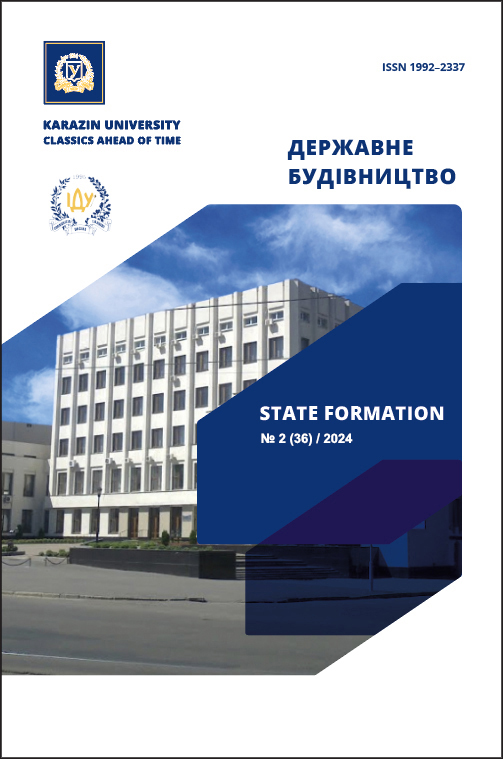The meaning of the category “public interest” in the public administration system.
Abstract
The article examines the main aspects of the problem of the ratio of private and public interest in the context of public administration, in particular the issue of harmonizing private and public interests, the role of public administration in ensuring the public interest, as well as ways to resolve conflicts between the interests of the state and an individual. The essence and meaning of the category “public interest” in the theory and practice of public administration are investigated. The problems of the ratio of interests of a person and the state, private and public interest are considered. The ways of harmonizing the state interest with the public and a set of private interests are analyzed. The statement that public administration is always aimed at the implementation and provision of the public interest is substantiated. Ways of solving the problem of harmonizing state interests and the interests of an individual are proposed. It is proven that the subject of public interest is a public need that has a social character and is necessary for the full functioning and development of society and individual social groups.
Downloads
References
Bezruk, O.O., Denysenko, I.D. (2013). Ukrainian society: theory and practice of democratic transit. Modern society, is. 2, 13–27. URL: http://nbuv.gov.ua/UJRN/cuc_2013_2_4 [in Ukrainian].
Galunko, V.V. (2010). Public interest in administrative law. Law Forum, no. 4, 178–182. URL: http://nbuv.gov.ua/UJRN/FP_index.htm_2010_4_29 [in Ukrainian].
Kolomiyets, T.O. (2004). Administrative coercion in public law of Ukraine: theory, experience and practice of implementation: monograph. Zaporizhzhia: Poligraf, 403 p. [in Ukrainian].
Kubko, A. (2020). State interests in the legal system of Ukraine: concepts, features, implementation. Public law. no. 1 (37), 160–168. DOI: https://doi.org/10.37374/2020-37-15 [in Ukrainian].
Melnyk, R.S. (2022). Public interest in public administration: starting positions of doctrinal understanding and practical application (under the legislation of Ukraine and Kazakhstan). Administrative law and process, no. 2 (37), 5–20. URL: http://applaw.knu.ua/index.php/arkhiv-nomeriv/2-37-2022 [in Ukrainian].
Official portal "Diya". URL: https://diia.gov.ua
Official page of the Ministry of Digital Transformation of Ukraine. URL: https://thedigital.gov.ua
Resolution of 13.02.2019 No. 810/2763/17 (K/9901/44258/18). (2019). Supreme Court of Ukraine. URL: https://reyestr.court.gov.ua/Review/79883398
On administrative procedure: Law of Ukraine of 17.02. 2022 No. 2073-IX. (2022). URL: https://zakon.rada.gov.ua/laws/show/2073-20#Text
On ensuring public participation in the formation and implementation of state policy: Resolution of the Cabinet of Ministers of Ukraine, November 3, 2010 No. 996. (2010). URL: http://zakon1.rada.gov.ua/cgi-bin/laws/main.cgi?nreg=996-2010-%EF
Barakso, M., Schaffner, B.F. (2008). Exit, voice, and interest group governance. American Politics Research, 36, 186–209. DOI: https://doi.org/10.1177/1532673X07306545
Berkhout, J., Beyers, J., Hanegraaff, M. (2022). The Representative Potential of Interest Groups. Internal Voice in Post-Communist and Western European Countries. Politics and Governance, 11(1), 1–10. DOI: https://doi.org/10.17645/pag.v11i1.5899
Dahl, R.A. (1991). Democracy and Its Critics. New Haven: Yale University Press.
Gil de Zúñiga, Homero; Huber, Brigitte; Strauss, Nadine. (2018). Social media and democracy. El profesional de la información, v. 27, no. 6, 1172–1180. DOI: https://doi.org/10.3145/epi.2018.nov.01
Habermas, J. (1989). The Structural Transformation of the Public Sphere. Cambridge: MIT Press.
Hood, C. (2000). The Art of the State: Culture, Rhetoric, and Public Management. Oxford: Oxford University Press. DOI: https://doi.org/10.1093/0198297653.001.0001
Marshall, Gary S., Choudhury, Enamu (1997). Public Administration and the Public Interest: Re-Presenting a Lost Concept. University of Nebraska at Omaha. Public Administration Faculty Publications. 72. URL: https://core.ac.uk/download/pdf/232748832.pdf
Putnam, R.D. (2000). Bowling Alone: The Collapse and Revival of American Community. New York: Simon & Schuster.
Samuelson, P.A. (1954). The Pure Theory of Public Expenditure. The Review of Economics and Statistics.
Smith, A. (2005). The Wealth of Nations. The Pennsylvania State University. URL: https://www.rrojasdatabank.info/Wealth-Nations.pdf
Stiglitz, J.E. (2002). Globalization and Its Discontents. New York: W.W. Norton & Company.

